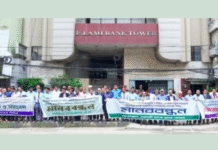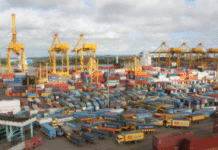Economists at a CPD discussion say political will is key to economic integration
Economic integration among states in South and South West Asia offers a huge potential for sustainable development in the region, said a report of the UN Economic and Social Commission for Asia and the Pacific (ESCAP) launched in Dhaka yesterday.
But analysts said political will is pivotal to make economic integration successful as a lack of trust and confidence among the Saarc states still holds the region back from reaping its full potential.
“For far too long politics has held back the progress in the sub-region. The time has come to allow economics to play a greater role and for regional cooperation to finally take the centre stage in the South and South West Asia,” said the report.
The South and South West Asia (SSWA) Development Report 2012-13 was launched at a policy dialogue on “value chains for inclusive development: lessons and policies for South Asia”.
The Centre for Policy Dialogue (CPD) in association with several national, regional and international organisations arranged the dialogue at BRAC Centre Inn. CPD Chairman Prof Rehman Sobhan chaired the session.
The sub-region, which includes Iran, Turkey and eight Saarc states, can become a $30-trillion market for the middle class by 2040-2050, said Nagesh Kumar, director for SSWA office of UN ESCAP, presenting the report.
The report said 57 percent of intra-regional trade potential remains unexploited in the Saarc (South Asian Association for Regional Cooperation).
It said countries in the sub-region can benefit from cooperation by facilitating regional investments and cross-border banking and raising capital. The countries will also benefit from cooperation in transport connectivity, food and energy security, agriculture and natural disasters.
The UN ESCAP argues that sub-regional economic cooperation can become a shield for the countries to withstand the global economic turmoil and slowdown.
“The report presents a very strong case if the region wants to re-emerge as a hub,” said Saman Kelegama, executive director of Institute of Policy Studies, Sri Lanka.
“The region shows enormous potential to take off. But what is needed is implementation. In this area, the Saarc has been lagging behind,” he said.
Citing strategic concerns of power outside the region to isolate Iran, CPD Chairman Rehman Sobhan said countries want to recognise Iran as a legitimate partner, and the issue of political economy should be addressed.
He also cited the domestic markets of the countries in the region and said raising the purchasing capacity of the working class can help create big domestic markets.
Prof Wahiduddin Mahmud said the rebalancing of economies will require for taking the advantage of domestic and regional markets.
He also said economic integration affects some industries in one country and another. So in order to have beneficial trade creation, there will be some resistance, said Mahmud. CPD Distinguished Fellow Debapriya Bhattacharya said regional cooperation can help the countries rebalance the source of growth.
He, however, cited India’s reluctance to give rice to Bangladesh, ban on cotton exports earlier and imposition of additional specific duty on Bangladesh’s textiles and said these policy measures undercut the issue of cooperation.
He said big economies such as India, Turkey and Iran should be on the frontline to tap the prospect of regional economic integration.
Dilliraj Khanal, chairman of Institute for Policy Research and Development, Nepal, stressed the need for reducing deficit in trust and confidence to harness the potential in the region.
Source: The Daily Star










